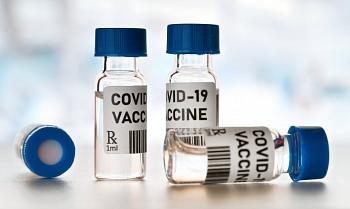Are There Any COVID Vaccine Side Effects? Here's What Experts Say You Can Expect After Each Dose
As the COVID-19 pandemic rages on and we’re all stuck inside until further notice, there is a glimmer of hope on the horizon in the form of a vaccine, which a handful of Americans have already gotten.
Right now, there are two mRNA—meaning they don’t carry live virus—COVID-19 vaccines on the market. The Centers for Disease Control and Prevention (CDC) note both the Pfizer-BioNTech and Moderna vaccines, both of which are now available, require two doses for full efficacy. Vaccines are not mandatory, but are strongly encouraged by the CDC and healthcare providers to protect you and others from the spread of COVID-19.
If you are hesitant because of the possibility of COVID vaccine side effects, the good news is, the risk of a severe reaction is low and—Dr. Julita Mir, M.D., Infectious Disease Physician and Chief Medical Officer of Community Care Cooperative—if mild side effects are experienced, they are limited to only 24-48 hours. So what side effects, if any, can you expect when you receive your doses of a COVID-19 vaccine? Here’s what the experts want you to know.
How do experts track vaccine side effects?
Vaccines do come with a small risk of side effects, though they’re rarely severe. In fact, according to the U.S. Department of Health & Human Services (HHS) estimates it is typical to have only one or two severe allergic reactions in a series of one million doses of a vaccine. While testing of a vaccine includes monitoring side effects and possible allergic reactions, more data will still be collected as the vaccine is rolled out to the public.
This is why Dr. Timothy Brewer, M.D., M.P.H., a professor of medicine in the division of infectious diseases and of epidemiology at the UCLA Fielding School of Public Health, explains that specifically with the mRNA COVID-19 vaccines, it isn’t surprising that there have been rare reports of side effects after their release.
“It’s to be expected that you’ll learn more about medical products as you use them in more people,” elaborates Dr. Brewer. “That’s why it’s so important to have systems like the Vaccine Adverse Event Reporting System (VAERS) run by the [U.S. Food and Drug Administration] (FDA) or the V-Safe systems where people can download an app on their phone and report side effects to the CDC.”
When side effects are experienced, both healthcare officials and the public have the ability to report any adverse reactions to the FDA and CDC. Data is then used to detect any patterns or unusual adverse events directly related to a vaccine.
Are reports of serious COVID-19 vaccine side effects cause for alarm?
While there have been reports in the news of severe allergic reactions from the mRNA COVID-19 vaccines, there’s no reason to panic. In fact, rare allergic reactions shouldn’t cause enough alarm to delay getting the vaccine, though doctors do recognize that it is a personal choice. It’s important to recognize that serious side effects have not occurred because of how quickly the vaccine was developed—these reactions are to be expected.
“The two vaccines that have been approved under emergency use authorization in the United States both have gone through the standard steps we use to approve vaccines,” adds Dr. Brewer. “It is just that the technology has gotten so much better and is built on research that has taken place for years that we could move through the process faster.”
The CDC instructs that, should you have a severe allergic reaction to one of the mRNA COVID-19 vaccines, it is not advised that you get the required second dose. When getting the vaccine, you are instructed to wait at the distribution site for anywhere from 15-30 minutes—depending on your history with vaccine side effects—to be monitored for any adverse reactions.
“Cases of [severe] allergic reactions need to be monitored, but so far, the number of these cases remain low,” reassures Dr. Mir. “Individuals with severe allergies to foods or medications, and those who carry epinephrine with them, require extra precautions including observations, access to emergency services, etc.”
What are the most common COVID-19 vaccine side effects?
Though severe allergic reactions are uncommon, there are some side effects that may occur when receiving the mRNA COVID-19 vaccines. The good news is it appears the side effects are not different from those experienced with a flu shot.
“The side effects of the COVID-19 vaccines are similar to those of other vaccines,” notes Dr. Susan Rehm, M.D., an infectious disease expert at Cleveland Clinic. “Most reported side effects are mild, such as fatigue, muscle aches, and headache.”





